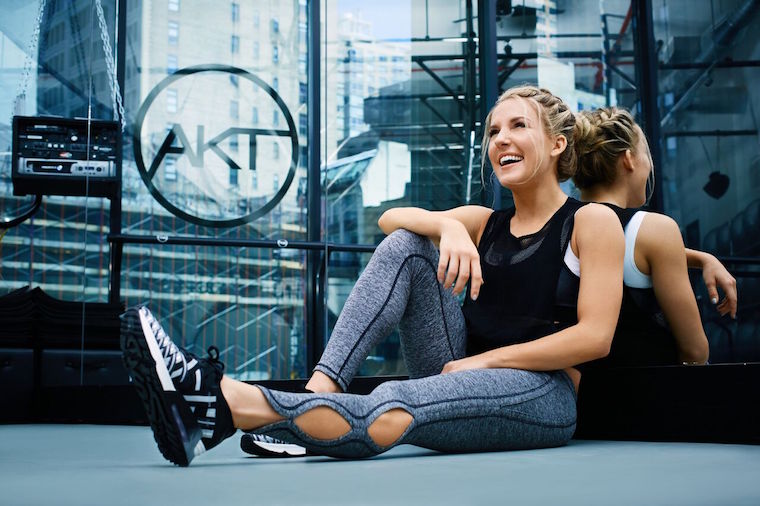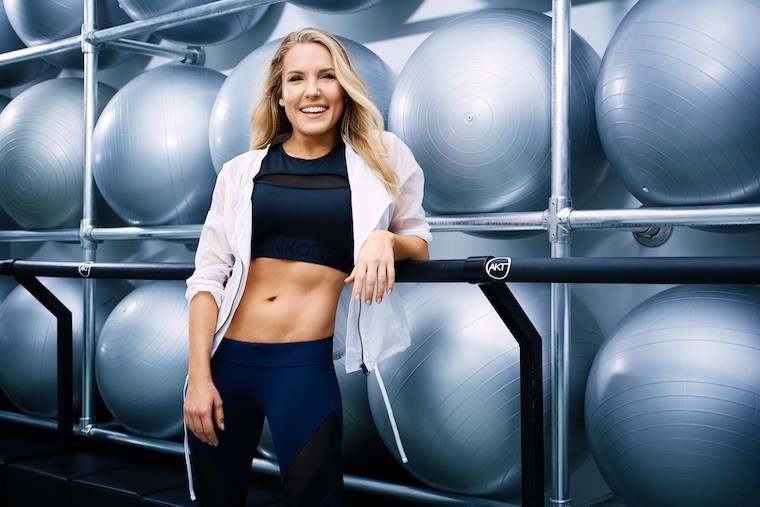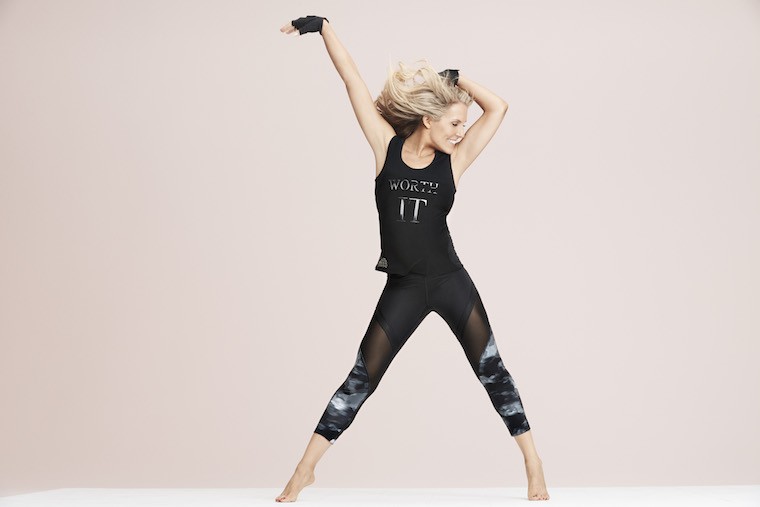Anna Kaiser’s Brilliant Email Trick for Maximizing Productivity
In this week’s Fit For Business, Well+Good’s co-founder and publisher Alexia Brue sits down with AKT founder, celeb trainer, and dance cardio dynamo Anna Kaiser.
For me it was love at first sight (or squat-toss) with AKT—and with the workout studio's brilliant, driven, and fun-loving founder Anna Kaiser.
Simply put, there just aren’t many leaders like her in the boutique fitness space. AKT, which has three New York-based studios (with more set to open this year—get ready West Hollywood), is more than just a dance cardio spot; with a range of classes for the choreography-challenged, impeccably planned retreats, a built-out on-demand platform, and buzzy product extensions (like an activewear collab with C9 for Target, which promptly sold out earlier this year), it's truly morphed into a lifestyle brand.
“I didn't start with this huge vision. AKT was something that organically took shape because there was a need that was being filled.”
At a time when boutique fitness is having a post-SoulCycle moment and fitness entrepreneurs are realizing there’s perhaps no successor at that same level, Kaiser’s strategy of organically building a lifestyle brand with myriad revenue streams and a strong digital footprint feels prescient. “I didn't start with this huge vision,” explains Kaiser. “AKT was something that organically took shape because there was a need that was being filled.”
Now, as Kaiser prepares to return to the studio after the birth of her first child (via, in true visionary style, a 5-day intensive program running in NYC later this month), she us about to close her Series A with investors. Though AKT is a big, nationally recognized fitness brand, its path toward that recognition has been slow and deliberate—and offers up a blueprint for aspiring entrepreneurs.
Here, Kaiser shares her advice on building a successful company from the ground up—and why you should seriously stop with the multitasking.

What was the inspiration behind AKT?
I wanted to create a comprehensive program—the kind my private clients get to experience, but in a boutique atmosphere. AKT takes the guesswork out of fitness. You don't have to go to four places for the workouts that you love and the results you want with educated trainers. We're not trained to do that for ourselves as human beings in the world; someone needs to create and cultivate that program for you.

{{post.sponsorText}}
Where did your entrepreneurial drive come from?
It came from a place of frustration. I had worked for companies that didn't foster or respect the talent that worked for them, so I wanted to be able to create a place with growth potential for really talented people. And I never felt like I walked into a gym, a boutique, a studio that made me feel really excited and happy. I just could not find the place to call home—so I said, "All right. I'm going to go and make it happen. I’m going to create that space."

What went into the decision to be not only the founder, but also the CEO, instead of seeking out a partner?
I didn't set out with the intention of creating a huge company. I simply had clients that loved what I was doing and encouraged me to open a studio. Then I decided to hire a team and eventually create a certification and a class program. It organically grew to the place where it became a much larger vision and company, so being the business leader as well felt attainable.
What advice would you give aspiring fitness entrepreneurs looking to get their business off the ground?
I had a long-time client who really believed in what I was doing. She said, "Why don't we open a studio? I really want to have a place to work out. I know you're ready for this, let's really do this!" It was just the two of us self-funding this. It was a small investment, and it really just went to cover the build-out of that Upper East Side space. From there, I funded everything else out of cash flow. Now we’re in a growth stage and I just finished my Series A, so we've really started focusing on brand growth.

Are you planning to ramp up studios or focus more on digital products?
Both, and we've been focusing on a lot of additional sources of revenue because it helps create a lifestyle brand. I don't want AKT to be just a workout. It really is a 360-degree lifestyle brand with the clothing line, the online streaming program, the app, the retreats, pre- and post-natal programs, and other partnerships. We also have a book in the works.
We are doing a lot more digital content, but I don't think that fitness will ever completely transition out of the studio because it's such a physical experience. So you still need to be able to tap into that energy exchange that comes from sharing space with people.
"I don't think that fitness will ever completely transition out of the studio because it's such a physical experience."
So much of being an entrepreneur and CEO is making decisions all day, every day. What was one key decision you made that was a real turning point for the company?
Deciding not to go big out of the gate—to not go hire a top-level management company and then scale from there. Instead, we chose organic growth and set out to prove the concept before then taking it to the next level and building out a much larger brand. Last year I had the opportunity to collaborate with a major partner to open studios all over the US, but I didn’t do it. I think it's really important to maintain quality control, to maintain the organic growth of the brand and the heart of the brand and not just to see numbers.

How do you keep yourself inspired as a CEO?
For me it's talking to other entrepreneurs and CEOs—being honest about challenges and questions, and being able to inspire each other with things that have gone well and things that have gone in the other direction. I think learning about people’s journeys as entrepreneurs is really helpful and it makes you feel like you’re not alone when things get tough.
Is there a piece of advice you give budding entrepreneurs?
Don't start a company because you don't want to work for The Man, because you hate your boss, or you think that [it will] somehow make your life easier. The entrepreneurial path is often much more difficult than working for someone else.
Also, I think it's important for someone to attempt something small first. Start a blog on the side of your current job and see if you enjoy growing that small gem. If you like everything that goes along with that, then maybe jump into a larger idea.
Don't start a company because you don't want to work for The Man, you hate your boss, or you think it will somehow make your life easier.
As a busy CEO, what are some of your efficiency hacks?
I don't make a to-do list. Instead, I put everything I need to do in my calendar. If I have to get something done, even if it’s a 10-minute follow-up or quick errand, I put it in my calendar. Also, I don't check my emails more than three times a day because work begets work begets work. If you stop and allow it to just simmer for two hours, usually everything resolves itself.
My last hack is to dedicate one hour at a time to a project. I put everything else away. Do not check emails, do not answer phone calls. Just focus on whatever that project is—it's the only way to truly get stuff done. Otherwise that project will end up taking you three days if you're multitasking as you do it, which we tend to do so often as women.
If you dream of turning your own passion into something bigger, here's how to determine whether it should be your side hustle or your full-time gig—plus some extra tips on doing it without burning out.
Loading More Posts...